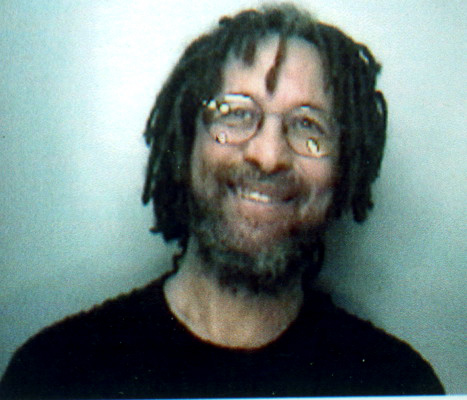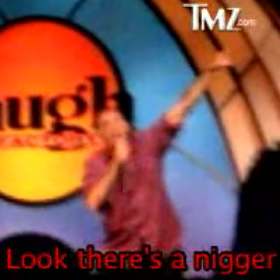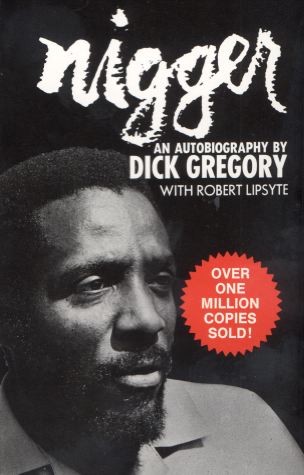

 CHOOSING WHO CAN BE USING THE "NIGGER" WORD
CHOOSING WHO CAN BE USING THE "NIGGER" WORD
I waited a bit to comment on comedian Michael Richards’
comedy club “nigger” meltdown, in part because there were other more pressing things
to write about, in part because the use of the word “nigger” in American life is
a serious, long-term discussion that need not rise to the surface only when it has
become the talk-show, blogsphere fad of the moment. I’ve written on the subject before,
at length, and expect to do it again, from time to time.
For those who missed it–if that is possible–former “Seinfeld” television star Richards
made national news late last month when he was caught on camera during a routine
at LA’s Laugh Factory responding to black hecklers in the audience by repeatedly
calling them “niggers.”
 "Throw his ass out,” Mr. Richards shouted. “He's a nigger!
He's a nigger! He's a nigger! A nigger, look, there's a nigger!" And when several
in the audience voiced their disapproval of his tirade, he said, "They're going
to arrest me for calling a black man a nigger." Richards also told the men,
“Fifty years ago we'd have you upside down with a fucking fork up your ass.”
"Throw his ass out,” Mr. Richards shouted. “He's a nigger!
He's a nigger! He's a nigger! A nigger, look, there's a nigger!" And when several
in the audience voiced their disapproval of his tirade, he said, "They're going
to arrest me for calling a black man a nigger." Richards also told the men,
“Fifty years ago we'd have you upside down with a fucking fork up your ass.”
For those who know something about recent American history, the reference to American
lynching immediately took Mr. Richards’ remarks out of the area of mere name-calling
and into the realm of the indefensible, and there were more than enough condemnations
from sources various and sundry to fill several file cabinets.
But Mr. Richards also had his defenders, people who wondered why it is okay for African-Americans
to use the word “nigger” while others are condemned for it.
Typical of that sentiment was someone signing himself “Jack” at Matt Dentler’s entertainment-based
blog (http://blogs.indiewire.com/mattdentler/), who remarked that it is “two-faced
of civil rights leaders to make a mountain out of mole hill with the comedian/actor
Michael Richards’s affair where he used the word ‘nigger’ multiple times. Black comedians
on the Black Entertainment Channel can scream ‘nigger’ and the audience will scream
with laughter with some almost falling out of their chairs. Pardon my French, but
if a Nigger says ‘nigger’ he is not engaged in a racist tirade and he can get paid
top dollar for doing it.”
“Sillier yet,” Jack continued, “the word "nigger" is so taboo that some
people are expected to make reference to it by saying ‘the n-word’. We do not have
a ‘g-word’ for ‘gringo’ [etc., etc. etc.] …
Jack concluded that Mr. Richards “was mouthing off at a night club where folks expected
some insults. Black folks, especially the civil rights leaders, ought to be able
to roll with the punches like everyone else.”
Like everyone else? No, let’s leave that. It’s a distraction.
In order to emphasize that we are advancing a universal truth rather than a point
of personal privilege, let us make our assertions, first, in broader terms rather
than the particular: those who are or have been the victims of some form or other
of social oppression–racial, religious, gender, et. al–forever retain the right to
use, in whatever way they want, the epithets used against them in advancing that
oppression. Those who were not and are not the victims, do not (except under special
circumstances, which we will talk about in a moment). That seems simple enough.
In other words, Korean-American comedian Margaret Cho can make all the jokes in Asian
dialect because she is of Asian descent, but comedian Rosie O’Donnell cannot. Ms.
O’Donnell, on the other hand, is free to joke at will about lesbians, while for Ms.
Cho (unless she is lesbian; I don’t know her well enough to determine), that is forbidden
territory. So it is, also, with my Native American brethren, who can ridicule Uncle
Tonto all they want. I would do so at my own risk.
There are, of course, exceptions to this rule.
The first is the “walk a mile in my moccasins” exception–those who are willing to
accept the burdens of the oppressed are also made benefit to whatever perks may accrue
(Johnny Otis, the Berkeley native musician who gave up his Greek ancestry early in
life to identify himself exclusively as African-American, heart and soul, comes instantly
to mind, here). The second exception are those who use ethnic epithets in their humor,
for example, as methods of healing rather than hurting. The comedian Richard Pryor
had the knack of it, almost always beginning his routines by ragging on himself–by
the time he moved on to black people in general (who he almost always referred to
as “niggers”) and then, finally, to other groups, the effect was more often than
not to show the universal humanity in all of us, rather than an emphasis on the differences.
But few of our non-African-American compatriots who seem so eager to be unleashed
to use the word “nigger” at will appear willing to put the time or the energy in
to qualify for either exception. Instead, like little children impatiently eyeing
the bright packages under the Christmas tree, the ask from time to time “can’t we
say it yet?,” sighing when told “no,” as if the word “nigger” were a present
that they just cannot wait to open.
The word “nigger” itself has vastly different effect upon most African-Americans,
depending upon who is using it.
For many years of our time here in this country, it was one of the terms we most
often used to apply to ourselves. When the term went out of general use as a self-identification–supplanted
by a succession of terms from “colored” to “negro” to “Negro” (with a capital “N”)
to Black (with a capital “B”) and then to the present-day “African-American”–“nigger”
was taken over exclusively as a perjorative and a put-down by anti-black racists.
But even in the 1950’s and the 1960’s, a move was afoot among African-Americans to
try to recapture the word, cleanse it, and rob it of its sting.
 In 1964, the comedian Dick Gregory titled his autobiography “nigger.”
On the dedication page is a note to his mother by way of explanation: “Dear Momma,”
it reads, “wherever you are, if ever you hear the word ‘nigger’ again, remember they
are advertising my book.”
In 1964, the comedian Dick Gregory titled his autobiography “nigger.”
On the dedication page is a note to his mother by way of explanation: “Dear Momma,”
it reads, “wherever you are, if ever you hear the word ‘nigger’ again, remember they
are advertising my book.”
That was, in part, the intent of many of the black comedians of the 60’s and 70’s–Richard
Pryor most famously and notably–attempting to defang the term by continued use. In
doing so, they were mirroring the use of the term in “non-polite” black circles.
One of the unspoken truths about black life is that many black people have never
stopped referring to each other by that term–not in a way of putting each other down,
but in descriptions that can range from admiration to friendship to affection, and
even love. This is a fact not widely-known outside the African-American community
but, then, why should it be?
Thus, the adoption of the term by today’s hip-hop generation–transformed from straight
“nigger” to its variation “nigga”–is not a new innovation at all, but merely a continuation
of a long-term trend. What is different is that through cd’s and videos, the rest
of the country–indeed, the world–is now privy to what used to be an exclusive and
private dialogue.
And, in fact, that usage of the term by African-Americans is by no means universally
accepted among African-Americans, and there is a fierce and healthy dialogue going
on amongst us as to its appropriateness under any circumstances. The results of that
discussion have yet to be determined.
Meanwhile, though the marvel of modern communications has allowed our non-black friends
and not-so-friends to listen in to its use by African-Americans, this should not
be construed as an invitation to join the “nigger” chorus. The term “nigger,” when
used by anyone but an African-American, almost regardless of the context, revives
dark and difficult memories–the rape of Africa, the slave trade, the horrors of the
Middle Passage, the yeas of Southern chain slavery, the Hundred Years of Terror between
the end of Reconstruction and the beginning of the Civil Rights Era. We live, now,
in the backwash of that foul history. And though African-Americans of my generation
are mostly polite and mention it far less than we think about it, the consciousness
and memory of our history, here, remains heavy on our minds. For almost all of us
of my generation it will never go away, not to the end of our lives.
A day will come when the word “nigger” will have lost its edge and bite, and generations
can read of it and talk, dispassionately, of its history and its meaning. But that
is not this day. And until that time, the word “nigger” belongs to African-Americans,
and we alone have the right to regulate its use.
We would ‘preciate it, a good number of us, if others would honor that.